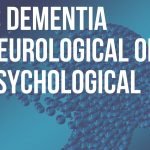When talking about dementia, there is one question that may come up i.e. is dementia a neurological disorder?
To answer this, it is important to know the definition of a neurological disorder.
This is a disease of the peripheral and central nervous system according to WHO (World Health Organization).
Simply put, these are disorders of the spinal cord, brain, muscles, nerve roots, cranial nerves, autonomic nervous system, peripheral nerves, and neuromuscular junction.
Going by this explanation of what neurological disorders are, it is right to categorize dementia as a progressive neurological disorder.
Read on to uncover some of the reasons why dementia is a neurological illness.
Contents
Why Dementia is Categorized as a Neurological Condition

To start off, it is vital to mention that dementia develops when parts of the brain responsible for memory, learning, language, and decision making are diseased or damaged.
These abnormalities that happen in the brain confirm that dementia is indeed a neurological disorder.
You will also notice that some of the causes of dementia are similar to those that lead to the development of certain neurological disorders.
It, therefore, comes as no surprise that a person may ask is dementia a neurological disease.
While the specific causes of neurological conditions vary, they include genetic disorders, infections, lifestyle-related causes, environmental influences, nutritional-related causes, and brain/physical injuries.
On the other hand, some of the most common dementia causes include traumatic brain injuries that may be as a result of concussions, car accidents, and falls, etc.
Central nervous system infections are also known to contribute to the development of dementia.
These can include HIV, Creutzfeldt-Jakob disease, and Meningitis, etc.
Although a huge percentage of dementia cases are not hereditary, there are some rare dementia cases that have strong genetic links.
Additionally, various degenerative neurological disorders are also known to cause dementia. These may include Parkinson’s disease, Alzheimer’s disease, dementia with Lewy bodies, Huntington’s disease, and frontotemporal lobar dementia.
Experts also recommend that people change their eating and lifestyle habits to healthier options as a way of preventing dementia development or managing the illness.
Signs of Neurologic Disorders and Dementia

When someone asks is dementia a neurological disorder, it can help to discuss some of the neurological signs that a person with the neurodegenerative disease can showcase like:
Emotional Symptoms

Persons with dementia may experience different emotional symptoms. These vary from one individual to the next, and can also depend on the stage of the illnesses.
The most common neurological emotional symptoms that the weak person experiences may include:
- Sudden outbursts
- Mood swings
- Delusions
- Depression
Physical Symptoms

Persons with dementia may also experience physical symptoms of neurological problems like:
1. Muscle weakness
2. Numbness
Some people will go through complete or partial sensation loss.
In such a case, a person may not feel any sensation that relates to temperature, pain, vibration, or touch.
Some cases are severe, where an individual cannot properly use their body parts; thus, have problems in driving, coordination, walking, balance, or completing any type of physical work including day-to-day activities.
3. Paralysis

This happens when a person loses muscle function in the body. It can be partial or complete and can occur on both or one side of the body.
4. Difficulties in speech, writing, and reading
A high percentage of people who have dementia will also have problems with communication where they cannot speak clearly. Some will also lose the ability to read and write well.
5. Seizures
These are sudden electrical disturbances of the brain that a person cannot control. They often affect levels of consciousness, feelings, movement, and behaviors.
Most seizures last between 30 seconds to 2 minutes.
6. Reduced alertness
Concentration levels of people with dementia may also reduce. They may not be able to hold long conversations or concentrate on a task long enough to complete it even when it was something they did easily before they got sick.
7. Diminishing cognitive abilities

This is where an individual has trouble with things like learning new things, making decisions, and memory that affects their day to day life negatively.
8. Body aches or pain
Most people with dementia will suffer unexplainable pain. An individual may experience chronic headaches, neck pain, pain in the joints and muscles, and back pain amongst others.
9. Sleep issues
Some individuals with dementia will either experience hypersomnia where a person sleeps excessively or insomnia where an individual does not get enough sleep.
The above are just a few warning signs that are an indication that there is a problem in the neurological system.
People with dementia will experience a majority of the warning signs.
This goes to show that yes, is the answer to the question is dementia a neurological disorder.
Dementia Patients Visiting Neurologists

Neurologists form part of the professional team that takes care of persons who have dementia.
The medical experts specialize in diagnosing, managing, and treating disorders of the spinal cord, nervous system, and brain.
It is best for a person who has dementia to consult a neurologist when they have problems with personality changes, speaking, clearly, thinking, and remembering.
A neurologist can also help detect some of the dementia warning signs for a person who has not yet gotten a positive diagnosis. They mostly do this by conducting a neurological exam and cognitive tests.
This helps the neurologist to evaluate an individual for problems that may point to brain disorders other than dementia.
The physician may look for signs of strokes, brain tumors, Parkinson’s disease, fluid accumulation in the brain, and other health conditions that may impair thinking or memory.
Some of the areas that the physician’s test include:
- Coordination, muscle tone, and strength
- Reflexes
- Sensation
- Speech
- Eye movement
In some cases, the neurological exam may also include studies of brain imaging.
The fact that neurological exams are part of the medical tests that professionals conduct to check whether a person has dementia helps to answer the query is dementia a neurological disorder on the positive side.
Closing Thoughts
When a person asks is dementia a neurological disorder, it is safe to say that yes it is.
This is mostly because neurodegenerative disorder is a result of damage to parts of the brain and it shares many warning signs with other neurological disorders.







